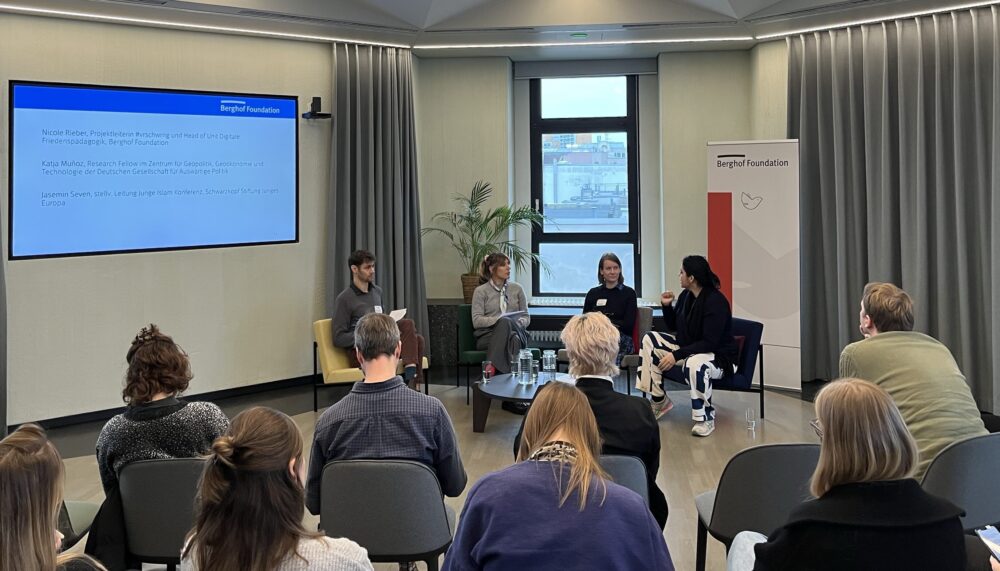BLOG POST | 12 Dec 2024
Tackling conspiracy thinking and disinformation through peace education

Insights from our #vrschwrng project closing event reveal the urgent need for innovative civic education in today's complex social media-driven landscape.
By Fidel Bartholdy, Nicole Rieber, Tessa Schindler, Laura Steinacher
When we planned the closing event for our #vrschwrng project, we did not anticipate just how timely it would be. We intended to explore conspiracy theories and disinformation, the power of social media, and their collective impact on elections. However, just two days before our event, the results of the U.S. election were announced, sparking global waves of shock, disappointment, uncertainty – and for some also celebration.
Germany faced its own political upheaval. On the very same day, the ruling coalition collapsed, setting the stage for new elections in February 2025 and triggering significant political shifts. Just after elections in three of Germany’s eastern states, where authoritarian and xenophobic parties secured major victories, the government’s collapse underscored an urgent need for action.
Suddenly, our carefully curated event on these topics felt less like a planned discussion and more like an emergency meeting on how to use the tools at hand to create an immediate impact. At the event, participants realised that we must expand our understanding of civic education so it does not only strengthen democratic institutions and values but rather protects them in times of uncertainty.

Looking back at five years of working on conspiracy thinking and disinformation
Our project #vrschwrng, which began in 2020, will come to an end in December 2024. In those five years, we successfully facilitated countless in-person encounters with young people and fostered real exchange of diverse perspectives and debates around critical questions. In classrooms across Germany, we were able to engage in discussions on how to challenge disinformation and conspiracy theories online.
In March 2023, we also launched Digital.Truth, a project that trains teachers, parents and other guardians of youth in their resilience towards disinformation and conspiracy thinking online. Born out of #vrschwrng, it equally creates in person learning spaces and integrates digital as well as analog methods. We successfully piloted an intergenerational approach at a joint workshop for students and teachers, taking away that there is mutual concern for each other´s generation and a need for joint learning spaces.
Lessons from our discussion on how conspiracy theories and disinformation are shaping democracies
In our closing event, our colleague Nicole Rieber discussed with Katja Muñoz , researcher on the intersection of democracy and social media, and Jasemin Seven, expert on social narratives and inclusion, how conspiracy theories, political narratives, and disinformation are shaping our democracies. They underlined the crucial role of educators and civil society in engaging on social media platforms. Nicole highlighted the urgent need to address the rise of far-right and extremist content on platforms like TikTok, noting: “Now is the time to experiment and see this challenge as an opportunity, even on platforms like TikTok.” According to the panelists, creating a “democratic background noise” is needed to ensure that young people scrolling through social media encounter content promoting constructive dialogue amidst harmful narratives.
Katja underscored the complexities of combating disinformation in fragmented information channels: “Trust matters more than facts. Through social media, wounds can be opened and problems exploited.” The shift away from centralised media systems to millions of fragmented accounts helps amplify disinformation, which, she argues, is “a deliberate strategy.” Jasemin added that tackling such strategies requires addressing emotions rather than solely presenting facts: “People may know something is false, but the question is: Do they want to believe it? Does it fit into their worldview?”
Telling someone not to be afraid is pointless. We need to listen and take their needs seriously.
Reclaim agenda-setting and envision futures that inspire
Katja focused on the importance of fostering trust and loyal communities through content. For example, podcasts offer deeper engagement compared to fleeting memes. The panel also noted the need to reclaim agenda-setting and envision futures that inspire rather than merely reacting to and countering narratives set by far-right actors.
Our panelists also emphasised the need to reach beyond established bubbles and speak to those who feel unseen or excluded. Jasemin observed that “young people with a migrant background are a demographic that also far-right parties will fight for, precisely because their invisibility has become a powerful argument.” This underscores the importance of inclusive outreach and narrative change, which Nicole emphasised should begin with listening: “Telling someone not to be afraid is pointless. We need to listen and take their needs seriously.”
Moving forward
As we look ahead, the rich discussions and insights from this event reinforce our commitment to expand and adapt projects like #vrschwrng and Digital.Truth. We aim to create educational spaces – online and offline – that empower young people to critically engage with the narratives shaping their worldviews. More than ever, we are convinced that working directly on social media platforms is not just an option but a necessity for effective education and outreach.
Media contact
You can reach the press team at:
+49 (0) 177 7052758
email hidden; JavaScript is required


